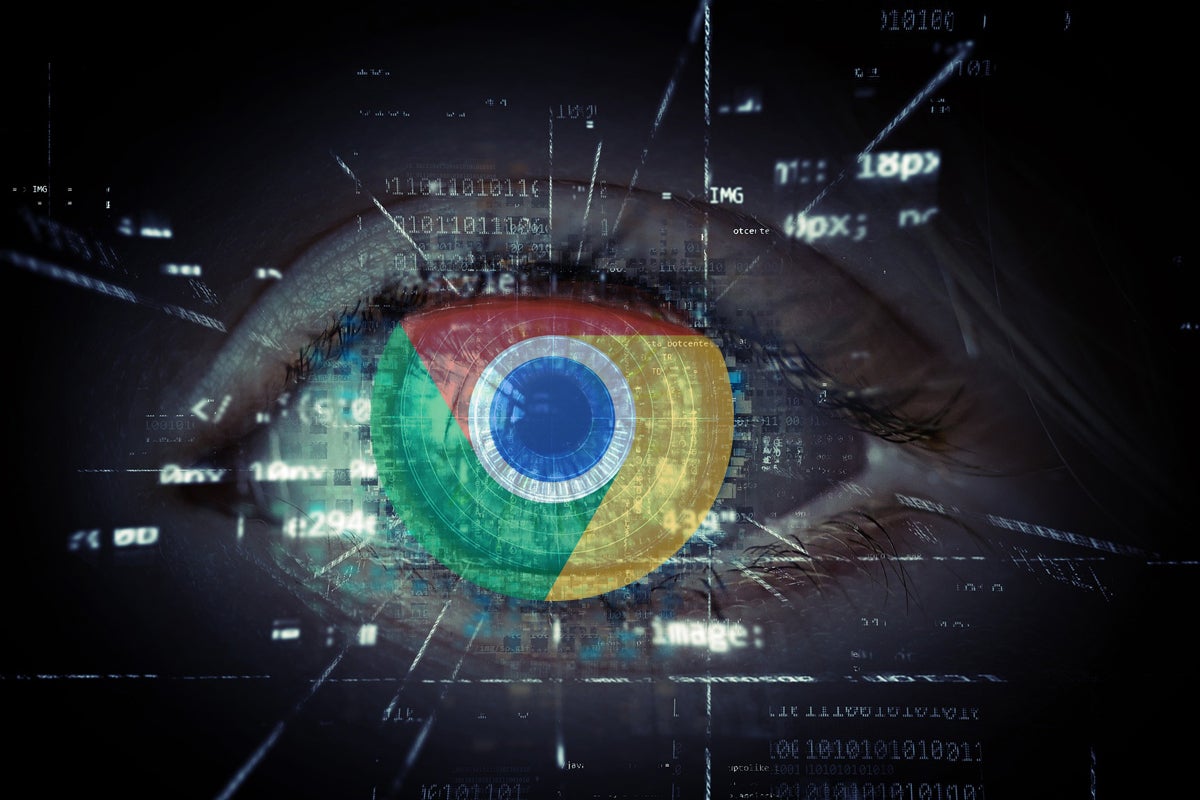Google's ChromeOS is the Rodney Dangerfield of modern operating systems: It's been around for ages now, and it pops up in all sorts of unexpected places. No matter how hard it works, though — boy, oh boy — it just can't get no respect.
Much like Dangerfield, ChromeOS's struggle to be taken seriously dates back to its childhood. When the software first entered the universe in the simpler tech times of 2010, it truly was a barebones effort. The entire platform was essentially just a browser in a box — a full-screen view of Google's Chrome browser, with no real apps to speak of and not much else around it.
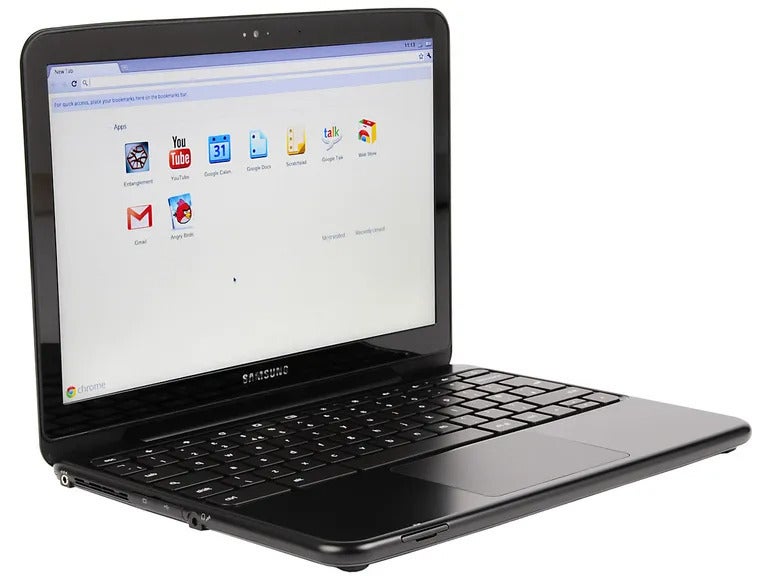 Samsung
Samsung
In its original form, ChromeOS was basically just a browser — as seen on the first-ever commercially available Chromebook, created by Samsung.
ChromeOS has come a long way since that time, and its core purpose has evolved considerably. And yet, ask an average person what they think about Chromebooks, and you're bound to hear the same tired old answer: "You can't do much real work on those things."
In reality, that couldn't be much further from the truth. And if Google gets its way, 2023 might finally be the year businesses start to see the platform's potential.
ChromeOS, from education to the enterprise
By and large, the story you see with Chromebooks is that they're fantastic — for kids in classrooms.
To be sure, education is broadly credited with ChromeOS's most recent rise, when the platform absolutely trounced Apple's macOS in terms of total sales toward the end of 2020. It wasn't the first time, but it was definitely the most extreme: During that period, market analysis firm IDC found Chromebooks were outselling Macs by two to one globally, helping ChromeOS claim 14.4% of the desktop computer market compared to Apple's 7.7% share. (Windows, as you'd expect, still owned the lion's share of the market, at a whopping 76.7%.)
But here's what's interesting: While the popular narrative at that point revolved around schools and the pandemic in particular driving most of ChromeOS's growth, research firm Canalys found Chromebooks have also been growing increasingly popular with small- to medium-sized businesses over the past few years — with "mounting interest" and an overall market size that nearly quadrupled in a matter of months.
That momentum has certainly cooled more recently, with Chromebooks following the rest of the PC market in seeing slower sales and analysts predicting a return to "more normalized growth" in the coming quarters. According to current data from research firm Gartner, ChromeOS's market share dropped considerably from 2020 to 2022, with just 6.8% of the worldwide PC market in 2022 and 19.7% within the US, specifically.
Those numbers are in line with IDC's measurements. That firm cites the same 6.8% worldwide market share figure for 2022 and forecasts that figure falling further to 6% in 2023.
Even so, in Google's view, the platform is progressing exactly as it needs to on a foundational level — and that, the company hopes, will set the stage for an even greater eventual growth spurt.
"I think we've really found our footing in a couple of areas," says Thomas Riedl, Google's director of product for enterprise and education. "What education taught us way back was that we're really good at managing a ton of devices at scale, and it's basically just worry-free. ... But then we realized the platform can be so much more."
Riedl says the "aha" moment for ChromeOS's enterprise potential struck when Google itself started issuing Chromebooks to its own employees as the default device across the company. "We developed our enterprise offering starting with ourselves, and we realized where we're a really good fit [and] where we might need to do some more work," he explains.
Accepting the fact that the de facto standard of Windows in the workplace was fine — "Nobody gets fired for buying Windows," as Riedl puts it — Google set out to determine where ChromeOS could be measurably better than what was already out there. And that led the company to zero in on a few specific areas where it saw professional needs being underserved.
Those areas include the arena of frontline workers in places like call centers, as well as some specific markets like manufacturing and healthcare. On that final front, Google just launched a sprawling new partnership that'll bring Chromebooks to clinicians across the US to give them a simpler and more secure setup without all the usual computing headaches.
"A lot of times, the [existing] solutions are just really patchwork," Riedl says. "They're taking what's there, but there's nothing really optimized end to end."
Research suggests going the Chromebook route can, indeed, make a difference in the right sort of situation — if a company actually commits. A January 2023 IDC report found that businesses relying on Chromebooks had higher productivity and significantly stronger security team efficiency, with 24% fewer attacks than organizations using more conventional computers. Over the course of three years, IDC says companies using Chromebooks can save nearly $4,000 per device as a result of these benefits.
(It's worth noting that Google did sponsor that study. That doesn't directly affect the results of the research, though; it just indicates that IDC undertook the project because of Google's investment.)
With those numbers in mind, Google's working to get ChromeOS present in more places where people will never even realize it's running — as the underlying technology powering kiosks, signs, and other passively viewed screens throughout the world. Already, the software is responsible for such displays in places like Buffalo Wild Wings, Panda Express, and Warby Parker. And Google sees those sorts of "unattended use cases" as a huge source of growth in the coming year.
"They're the trickiest, because oftentimes, there's not [always] the same user in front of them," Riedl says. "And we can serve that need super well."
But Google's ambitions for ChromeOS in the business world run deeper yet — as do its plans for pushing the platform forward in 2023 and beyond.
ChromeOS's next steps
When it comes to its actual user interface, ChromeOS has been on a bit of a journey for years now. It's something I've referred to as the "Androidification" of ChromeOS — the slow but steady alignment of Google's two primary platforms and, more than anything, the influx of Android-like interface and feature elements into Chromebooks.
This process seems to be a never-ending mission, and even after years of development, we're still seeing new Android-reminiscent elements appear in ChromeOS to this day.
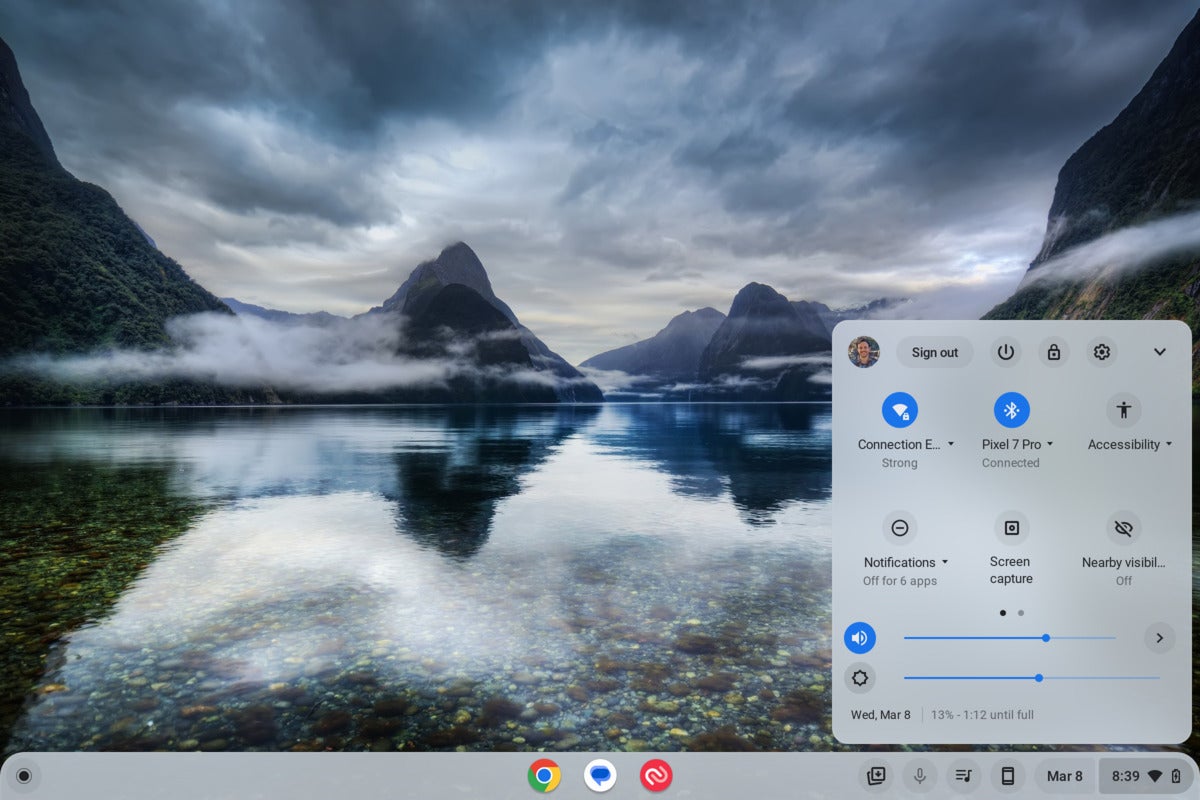 JR Raphael/IDG
JR Raphael/IDG
ChromeOS boasts numerous distinctly Android-like elements, including its Quick Settings interface shown in the lower-right corner of the screen. (Click image to enlarge it.)
All signs suggest those efforts will keep charging forward at a steady pace. Where Google sees the most significant business-aimed advancements this year, though, is in the area of integration — not with Android, specifically, but with allowing third-party apps and accessories to work effortlessly with all parts of the operating system, including the browser.
Say, for instance, a call center relying on Chromebooks wants to empower work-related websites to create new ChromeOS Virtual Desks and open and close browser windows automatically for its workers. Riedl and his team are focused on making that not only possible but also easy to accomplish. "You don't need to run additional apps or agents on the device ... to get all the signals that you need and actually have an optimized solution," he says.
Another area of enterprise-oriented focus in the works is expanded support for Windows apps within the ChromeOS environment. While Google had previously worked on a partnership that allowed you to run an entire instance of Windows directly on a Chromebook, it's finding that more and more companies now prefer a simpler approach — wherein such apps are packaged in a way that looks and feels local but is actually streaming securely from a remote server.
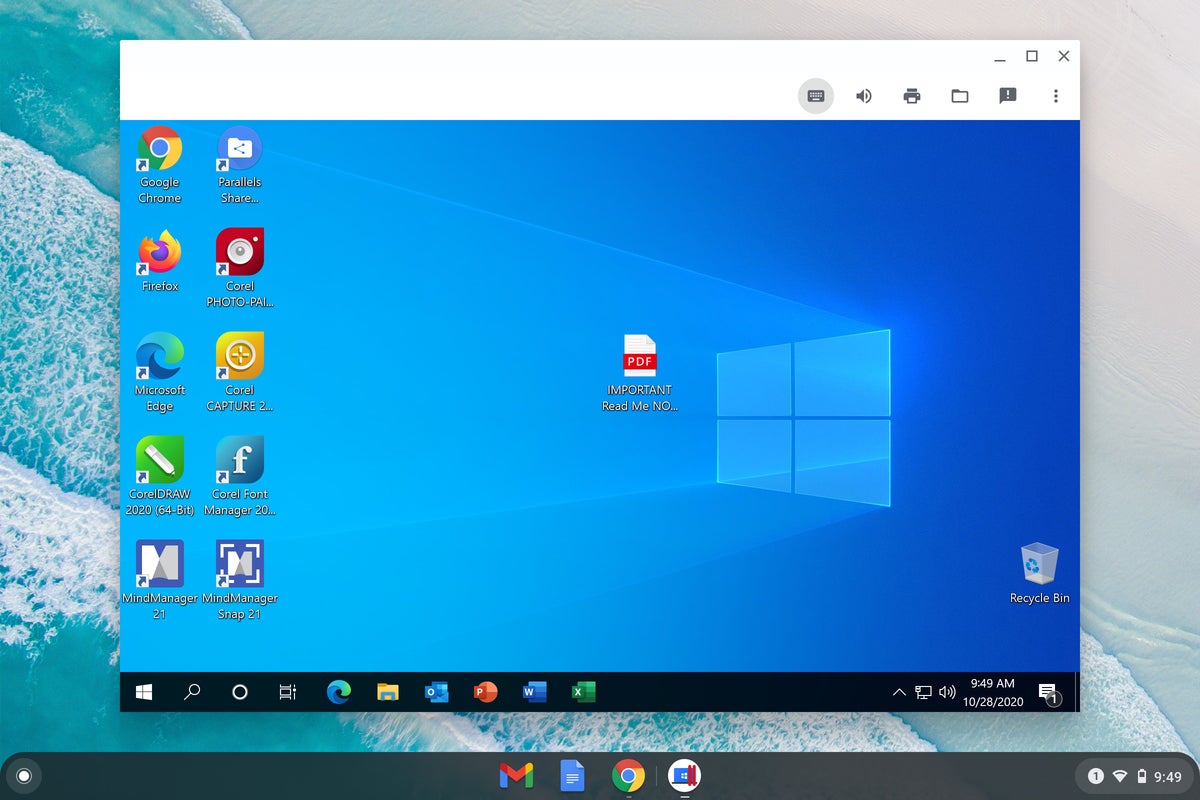 JR Raphael/IDG
JR Raphael/IDG
Google is moving from an approach that let businesses run Windows apps by way of a complete local instance of the operating system, as seen here, to one that's more app-specific and streaming-oriented. (Click image to enlarge it.)
Google refers to those situations as "legacy needs," and it's working with a company called Cameyo to ensure that businesses can retain access to specific Windows apps that can't be replicated by any of the ChromeOS-native options. (Disclosure: Cameyo recently sponsored an issue of my Android Intelligence newsletter.)
"That's the brave new world we're going towards," Riedl says. "As bandwidth costs are coming down, as the server costs are coming down, you don't have to run everything locally. You can actually cover your needs from the cloud at high uptime and low latency."
In that sort of scenario, a Windows app actually appears on a Chromebook as a progressive web app. But as far as the end user is concerned, none of the technical specifics should matter; they just click an icon in their app drawer, the same way they'd open any other app, and the app runs — as if it were right there on the device.
And speaking of Windows, another area where Google sees ample room for enterprise growth in 2023 is with its ChromeOS Flex setup. That's an offering that lets anyone convert an old Windows or Mac system into a fully functioning, routinely updated ChromeOS computer — with just a few asterisks separating it from a standard Chromebook setup.
"The hardware's fine," Riedl says, in explaining the program's appeal to businesses with old PCs on hand. "The software's the problem. So we give them better software."
Riedl says Google plans to continue expanding the number of specific old computer models it tests, certifies, and supports as part of the ChromeOS Flex program in the coming months, while maintaining its focus on a web-centric experience for Flex-converted systems.
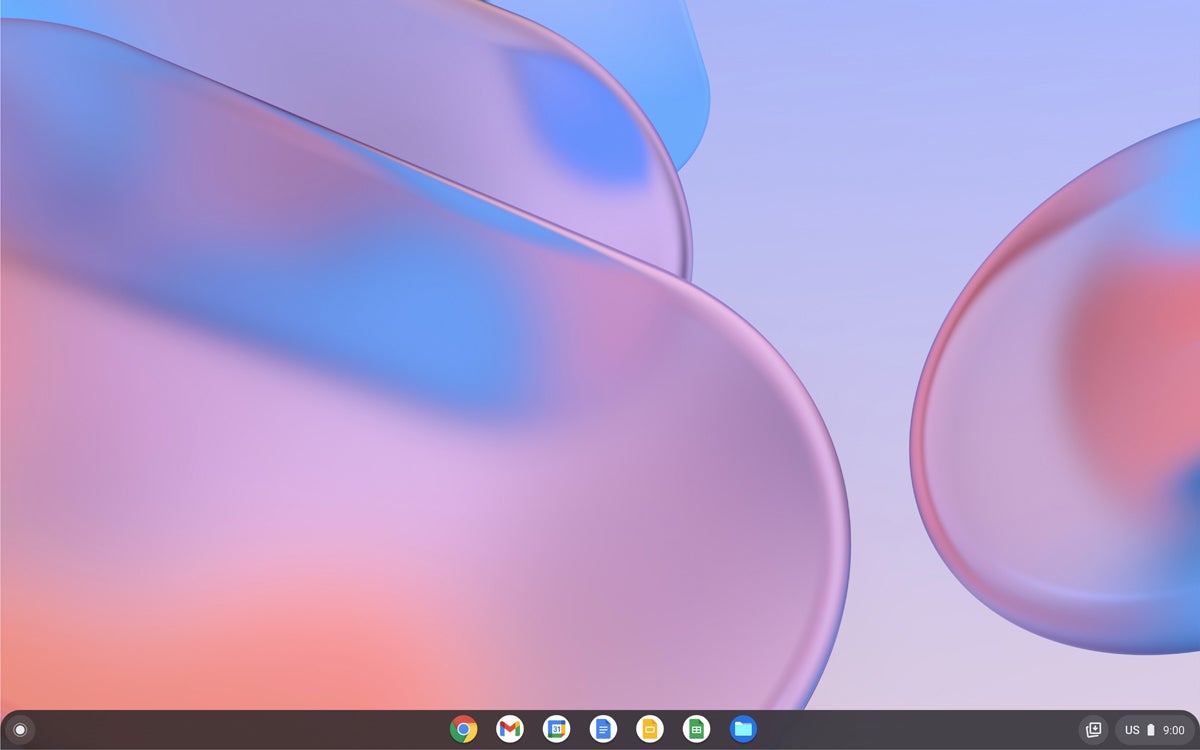 Google
Google
At first glance, a converted computer running ChromeOS Flex doesn't look much different from a regular Chromebook.
Unlike the standard ChromeOS platform, ChromeOS Flex notably does not support Android apps or the Google Assistant. Riedl tells me there's significantly less demand for such items in the enterprise and education markets, so bringing support for those systems into Flex hasn't been a top priority.
"The bigger theme for us this year is very much around supercharging productivity for our customers, especially enterprise," he says. "We don't want to just catch up or copy features. We want to add features that can significantly improve the user experience."
On the enterprise front in particular, Google has its work cut out for it. IDC estimates that just over 8% of Chromebook sales in 2022 were made for commercial purposes — compared to 72% for education and the remaining 20% for consumer use. IDC expects the business part of that puzzle to keep growing but only slowly, with 9.5% of Chromebook shipments projected to be business-oriented in 2023.
But here's the twist: According to Jitesh Ubrani, an IDC research manager who focuses on mobile devices, ChromeOS's limited success in traditional workplaces so far has largely been a result of companies' concerns around app compatibility. "Most businesses rely on specific apps [and] services which just aren't made available on Google's OS," Ubrani says.
So it seems Google may be on the right path with its efforts to make such "legacy" programs easier to use on Chromebooks as well as to repurpose older PCs as Chrome-based computers — all while simultaneously charging forward in the work-oriented areas where a cloud-centric computing model requires no additional accommodations.
The pieces are all there, and Google clearly has a strategy. The question now is if businesses are ready to consider it — or, put another way, if ChromeOS can finally get the respect it's been seeking so long.






